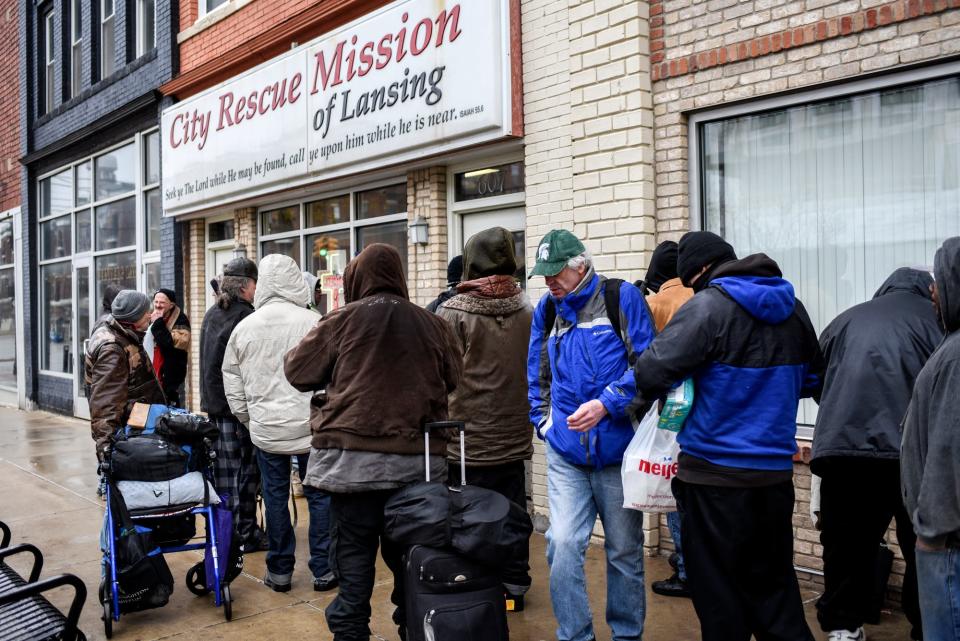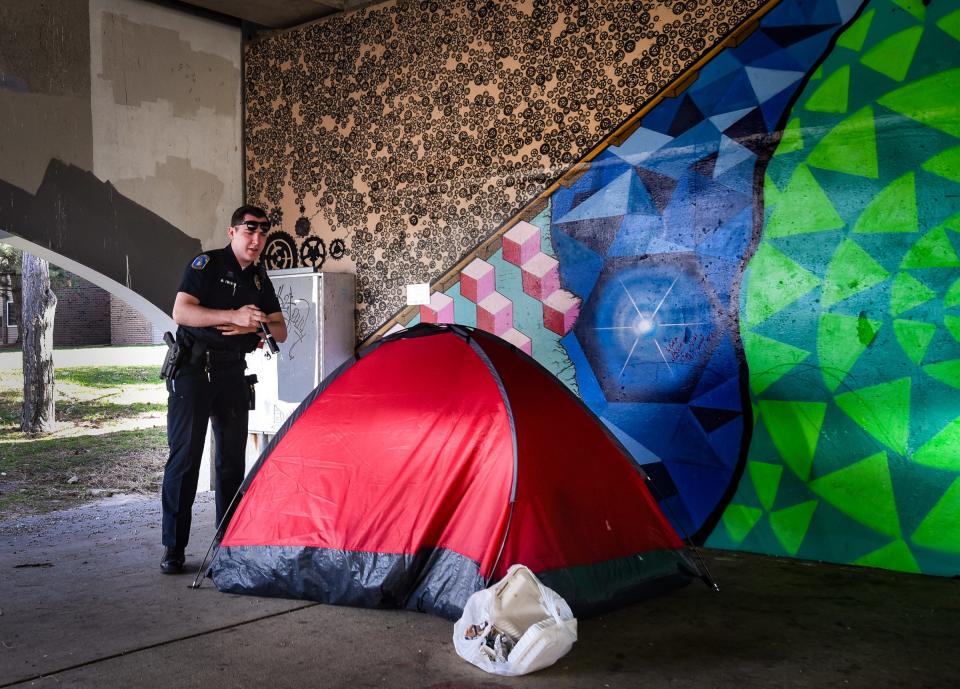Lansing says publicly owned emergency shelter is cost-prohibitive

- Oops!Something went wrong.Please try again later.
LANSING — The city isn't likely to be operating its own emergency shelter for those experiencing homelessness anytime soon.
The city's Human Relations and Community Services department in a study found that it would cost Lansing about $2.6 million to acquire and rehabilitate a 5,000-square-foot space into a 24-hour emergency center, City Spokesperson Scott Bean said in an email to the State Journal in response to questions from the State Journal.
"There have been some people in the community calling on the City to purchase, renovate, furnish, and staff a city-owned 24/7 shelter," Bean wrote. "The cost to taxpayers and the City budget would be far too great to do that."
Mayor Andy Schor directed HRCS to explore costs after a Change.org petition started by The People's Council of Lansing, a grassroots accountability organization, garnered over 200 signatures in January.
More: Schor administration open to idea of publicly funded 24/7 homeless shelter
The petition requested a taxpayer-funded shelter to boost social services and increase facilities available during harsh weather conditions. The petition claims a city-operated venture would be more stable than private ones where funding is unpredictable.
"A public facility would have the resources and ability to offer a wider range of services to those using the space. This, in a long-term sense, could include access to transportation, healthcare, and social services, in addition to basic shelter," the group wrote in its petition. "A non-profit or religious organization, with less proximity and accountability to existing government institutions, may not be able to offer the same level of support."
Activist Mike Lynn, who established the People's Council of Lansing alongside his wife Erica, and Jerry Norris, CEO of the Fledge, said they believed the city put the numbers out so others can say it's not doable. But Lynn said the city doesn't understand what the People's Council requested.
"There are tons of ways they can do an emergency shelter," he said. "We're talking about a place for extreme temperatures, for people to get inside and be warm or cool."
Costs too high to justify

Staff only researched possibilities of acquiring an existing space to mitigate expenses. Still, the costs were too high for the city to justify, Bean wrote. The roughly 5,000 square foot space would serve 100 to 150 adults.
He added the estimates were based on areas zoned where a shelter could be run. Shelters are permitted under a variety of zoning and uses, according to the city's Planning Office.
There are only seven properties for purchase in Lansing that have at least 5,000 square feet of space for $650,000, according to LoopNet, a commercial real estate website. An additional $1.125 million would be needed to renovate the space to accommodate bathrooms, showers, commercial laundry, offices for staff and any necessary electrical, plumbing and HVAC upgrades.
"This would not include a kitchen or food service/dining space," Bean wrote.
It would cost the city $877,640 annually to staff, furnish and provide services in the new space, among other necessities.
Norris ran a warming center at The Fledge winter and had 42 people come in. He acquired the 12,000-square-foot church The Fledge is in several years ago for $140,000.
He doesn't want to reopen it as a warming center — and a city Fire Marshall shut him down for not having proper permits — but he said he'll do it if it keeps people alive.
"I'm not going to let people die," he said.
The city sent him a letter on March 15 notifying him The Fledge cannot operate as an overnight stay due to a lack of building and zoning permits to comply with special land use and the state building code.
"Allowing overnight occupancy in a building that has not been inspected for compliance with the Building Code put those persons staying in the facility at substantial risk in the event of an emergency situation," the letter from the city's Department of Economic Development and Planning read. "Therefore, all overnight occupancy at 1300 Eureka Street must be discontinued within seven (7) calendar days from the date of this letter. Failure to do so will result in enforcement action by the City to prevent any continued illegal usage of the building."
Norris said he's not getting permits to be a temporary center.
Lynn said there are other options for an emergency center that would provide space for those who are vulnerable or at risk of death during extreme weather to seek relief.
"You can open up city hall, CATA bus station to house these people," he said.
City Councilmembers Adam Hussain and Jeffrey Brown told the State Journal they were unaware that the city has compiled projections on how much an emergency center would cost.
"That's the first time here are those numbers," Hussain said. "I'd be interested to know how they came up with those numbers. I would really be interested in determining what the ongoing cost would be."
Brown and Hussain sit on the Ad-hoc Homelessness & Solutions committee alongside councilmember Patricia Spitzley and various residents and nonprofit leaders.
Brown said keeping city council and others in the dark about this budget exploration doesn't help build trust, transparency or a collaborative environment within the city.
Schor announced he was having staff explore the costs of the emergency shelter at a citizen’s budget priority meeting, Bean said, and it was reported in local media, he added.
City seeks $800K for homeless issues

Bean wrote the city has instead requested $800,000 from the state and federal government to address homelessness in the city. He didn't say what exactly that money could fund.
"Because the costs to build a new facility that would duplicate services being provided by other agencies are too great, the City has asked for funding from both the federal and state government to utilize existing space and services offered by community partners," he wrote.
Lynn nor Norris are optimistic about the city's future in this endeavor. They both wanted the city to have the same urgency to homelessness it had with the public safety bond proposal. The proposal OK'd by voters in November of last year will provide $175 million to construct a new home for the 54A District Court, the city's jail, the Lansing police and fire departments and renovation of several fire stations among other issues.
Brown said if the city administration feels so strongly about resolving homelessness, they should put more effort into it.
"You have to make investments where you're not necessarily going to make financial profitability," he said. "If there's an investment that needs to be made to increase the quality of life of everyone in Lansing, then that's something that needs to be invested in."
Bean contended the city is the only one in the region that provides the most services for those experiencing homelessness.
"While people in every community can face housing insecurity or homelessness, Lansing is the only municipality in the capital region that provides this current level of service to these residents," Bean wrote. "We are proud to assist those in need and would love for more surrounding communities to provide the kind of financial assistance needed to help support the region’s homeless population."
Support local journalism and get unlimited digital access! Subscribe for only $1 for three months!
Contact reporter Krystal Nurse at 517-267-1344 or knurse@lsj.com. Follow her on Twitter @KrystalRNurse.
This article originally appeared on Lansing State Journal: Lansing says publicly owned emergency shelter is cost-prohibitive

